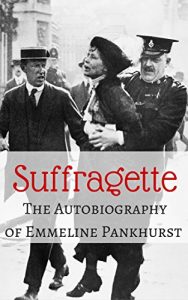Now a major motion picture!
Emmeline Pankhurst was a leader of the British suffrage movement in a critical era—the early 1900's—and helped women win the right to vote. Although reviled by many for the violent tactics that she eventually adopted, including arson, she was named by Time magazine as one of the 100 Most Important People of the 20th Century.
In this fascinating autobiography, originally published as "My Own Story", Pankhurst details the story of the women's suffrage movement, including the escalating battle between activists and the government, her multiple stints in prison, hunger strikes, and forced feeding.
This books has been carefully proofread and curated for quality. It includes all original illustrations, and is customized for display on the Kindle.
Excerpt:
This vague feeling of mine began to shape itself into conviction about the time my brothers and I were sent to school. The education of the English boy, then as now, was considered a much more serious matter than the education of the English boy's sister. My parents, especially my father, discussed the question of my brothers' education as a matter of real importance.
My education and that of my sister were scarcely discussed at all. Of course we went to a carefully selected girls' school, but beyond the facts that the head mistress was a gentlewoman and that all the pupils were girls of my own class, nobody seemed concerned. A girl's education at that time seemed to have for its prime object the art of "making home attractive"—presumably to migratory male relatives. It used to puzzle me to understand why I was under such a particular obligation to make home attractive to my brothers. We were on excellent terms of friendship, but it was never suggested to them as a duty that they make home attractive to me. Why not? Nobody seemed to know.
The answer to these puzzling questions came to me unexpectedly one night when I lay in my little bed waiting for sleep to overtake me. It was a custom of my father and mother to make the round of our bedrooms every night before going themselves to bed. When they entered my room that night I was still awake, but for some reason I chose to feign slumber. My father bent over me, shielding the candle flame with his big hand. I cannot know exactly what thought was in his mind as he gazed down at me, but I heard him say, somewhat sadly, "What a pity she wasn't born a lad."
My first hot impulse was to sit up in bed and protest that I didn't want to be a boy, but I lay still and heard my parents' footsteps pass on toward the next child's bed. I thought about my father's remark for many days afterward, but I think I never decided that I regretted my sex. However, it was made quite clear that men considered themselves superior to women, and that women apparently acquiesced in that belief.
Emmeline Pankhurst was a leader of the British suffrage movement in a critical era—the early 1900's—and helped women win the right to vote. Although reviled by many for the violent tactics that she eventually adopted, including arson, she was named by Time magazine as one of the 100 Most Important People of the 20th Century.
In this fascinating autobiography, originally published as "My Own Story", Pankhurst details the story of the women's suffrage movement, including the escalating battle between activists and the government, her multiple stints in prison, hunger strikes, and forced feeding.
This books has been carefully proofread and curated for quality. It includes all original illustrations, and is customized for display on the Kindle.
Excerpt:
This vague feeling of mine began to shape itself into conviction about the time my brothers and I were sent to school. The education of the English boy, then as now, was considered a much more serious matter than the education of the English boy's sister. My parents, especially my father, discussed the question of my brothers' education as a matter of real importance.
My education and that of my sister were scarcely discussed at all. Of course we went to a carefully selected girls' school, but beyond the facts that the head mistress was a gentlewoman and that all the pupils were girls of my own class, nobody seemed concerned. A girl's education at that time seemed to have for its prime object the art of "making home attractive"—presumably to migratory male relatives. It used to puzzle me to understand why I was under such a particular obligation to make home attractive to my brothers. We were on excellent terms of friendship, but it was never suggested to them as a duty that they make home attractive to me. Why not? Nobody seemed to know.
The answer to these puzzling questions came to me unexpectedly one night when I lay in my little bed waiting for sleep to overtake me. It was a custom of my father and mother to make the round of our bedrooms every night before going themselves to bed. When they entered my room that night I was still awake, but for some reason I chose to feign slumber. My father bent over me, shielding the candle flame with his big hand. I cannot know exactly what thought was in his mind as he gazed down at me, but I heard him say, somewhat sadly, "What a pity she wasn't born a lad."
My first hot impulse was to sit up in bed and protest that I didn't want to be a boy, but I lay still and heard my parents' footsteps pass on toward the next child's bed. I thought about my father's remark for many days afterward, but I think I never decided that I regretted my sex. However, it was made quite clear that men considered themselves superior to women, and that women apparently acquiesced in that belief.






